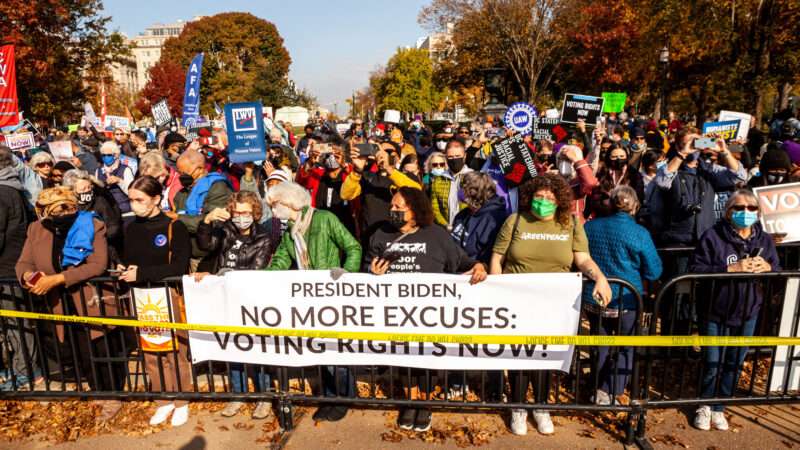
With the apparent death of talks over President Joe Biden’s “Build Back Better” legislation, some Democrats seem poised to pivot to a bill on voting rights.
Sen. Bernie Sanders (I–Vt.) indicated earlier this month that even if the “Build Back Better” bill is not passed, he saw a voting rights bill as “a lot more important.” And in a letter to Senate Democrats, Senate Majority Leader Chuck Schumer (D–N.Y.) expressed that he plans to bring forward a voting rights bill after the holiday, “as soon as the first week back.”
But if Democrats hope to counter Republican states’ restrictive new voting laws, not to mention prevent a repeat of 2020’s certification nightmare, then their current proposals are lacking.
The first voting rights bill congressional Democrats put forward this year was H.R. 1, the “For the People Act of 2021.” H.R. 1, which passed the House, includes national standards for automatic voter registration and mail-in voting and promotes statehood for Washington, D.C. There are also provisions to curb gerrymandering by requiring states to set up nonpartisan redistricting commissions, which have seen some success so far in states that have tried them.
But on the actual mechanics of voting, H.R. 1 is lacking. Jessica Huseman, editorial director of Votebeat, wrote in The Daily Beast after the bill passed the House that many of its provisions around voting systems “show remarkably little understanding of the problems the authors apply alarmingly prescriptive solutions to.” She writes that some of its contents “are literally impossible to implement,” and overall “the bill would make elections less secure by forcing states to rush gargantuan changes on deeply unrealistic time frames.”
For example, the law requires every state to implement some form of automatic voter registration by 2023, based on citizens’ interactions with state agencies like public health or driver’s services. But this timeline does not take into account the sheer magnitude of the task, which would involve streamlining each of those separate agencies’ databases such that they could interact smoothly. Additionally, the law mandates that every state purchase very specific voting machines which meet standards that the federal Election Assistance Commission only established earlier this year. The problem with this, as Huseman notes, is that such machines “don’t even exist yet,” and “won’t be in heavy circulation until well into 2025.”
Even though supporters of the bill sell it as a solution to restrictive new voting laws in Republican-led states (or to lawmakers simply overturning electoral outcomes themselves), Vox notes that much of the bill would be relatively ineffective. Further, it was largely drafted before January 6, casting doubt on how it might address post-election challenges like those of former President Donald Trump. Since the passage of H.R. 1, Democrats have shifted their focus to a different bill, the “Freedom to Vote Act,” though this bill would also be significantly narrower in scope than the For the People Act as a compromise to Republicans and moderate Democrats.
Unfortunately, the impulse to simply “just do something” in the face of a problem is not new. It isn’t uncommon that mass shootings spur lawmakers to suddenly call for new gun control measures. In response to last month’s school shooting in Michigan, many gun control advocacy groups have expressed disappointment at Biden’s lack of progress on the issue of gun control.
But the results of the “just do something” approach on gun control laws should speak for themselves: Earlier this year, California’s ban on assault weapons was struck down by a U.S. district court judge, citing the Supreme Court’s ruling in 2008’s D.C. v. Heller. The law’s content was similar to the federal assault weapon ban which expired in 2004, but which many Democrats, including the president, wish to revive. In addition to the constitutional issues, the law’s definition of an “assault weapon” was nearly entirely superficial: Features such as a pistol grip or folding stock were enough to earn the title, despite having little or no bearing on the weapon’s use.
If the intent is to prevent mass shootings, then assault weapons bans would be little help, though they would certainly make legal gun ownership more difficult. Similarly, new voting rights laws as proposed this year by Democrats would impose undue burdens on the states and localities tasked with enforcing them, while having little or no effect on the actual issues for which they were intended.
The post As With Gun Control, Democrats' Voting Reform Bills Unlikely To Make a Difference appeared first on Reason.com.
from Latest – Reason.com https://ift.tt/3ew05bv
via IFTTT